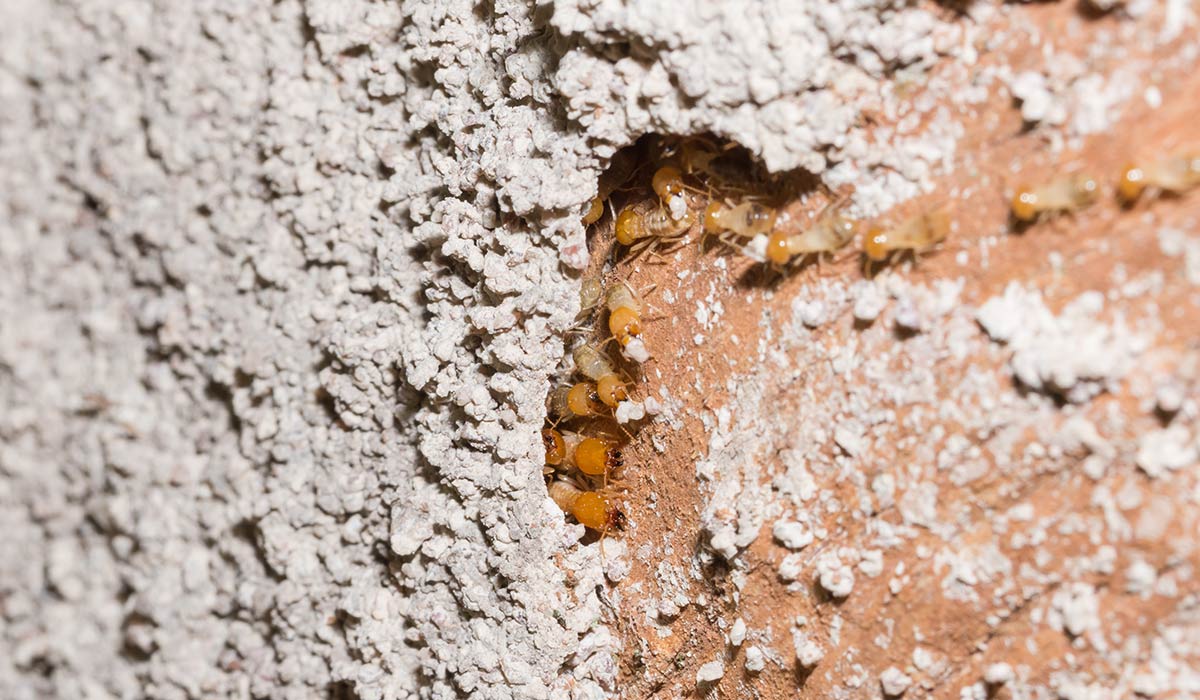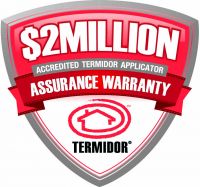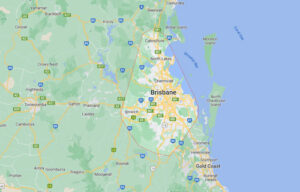
Experienced Termite Inspections
Protect your home from the devastating impact of termites.
These pests thrive, often unnoticed until it’s too late. Regular pest inspections are essential to detect early signs and prevent costly damage.
Our experienced technicians use the latest technology to identify termite activity, ensuring your property remains safe and structurally sound.
Don’t wait for visible damage; safeguard your biggest investment. Choose the best termite inspections for Brisbane and the Gold Coast. Trust the experts; trust us. Act now!
How do I know if I need termite inspections?
Determining whether you need termite control in Brisbane and the Gold Coast involves considering several factors:
- Geographic Location: Brisbane and the Gold Coast are located in areas known for high termite activity due to their warm and humid climates.
- History of Infestation: If your property or neighbouring properties have had termite issues in the past, it’s wise to get regular inspections.
- Wooden Structures: Homes primarily made of wood or those with substantial wooden components are at higher risk.
- Age of Home: Older homes may be more susceptible if they have yet to be inspected or treated recently.
- Visible Signs: Mud tubes on exterior walls, hollow-sounding wood, or discarded wings from termite swarms are indications of infestations.
- Local Construction: Nearby construction can disturb termite colonies, causing them to seek new homes, which might be yours.
- Time Since Last Inspection: If it’s been more than a year since your last inspection, it’s a good idea to schedule one.
If any of these factors apply to your situation, or if you’re unsure about the potential risk, schedule a termite inspection with Mr Termite.
How much do termite inspections cost?
The cost in Brisbane and the Gold Coast can vary based on several factors. Here are some general guidelines:
- Size and Complexity of the Property: Larger homes or properties with multiple structures or difficult access points may command higher fees due to the time and expertise required.
- Type of Inspection: Some companies offer advanced inspections using thermal imaging or radar technology, which can be more expensive than traditional methods.
- Reputation and Experience of the Inspection Company: Established companies with a long history and good reputation might charge more than newer or less-known companies.
- Frequency of Inspection: One-time inspections might have a different cost compared to signing up for a regular inspection plan or service agreement.
- Additional Services: If the inspection includes treatments, prevention methods, or guarantees, the cost might be higher.
The pricing could range from $200 to $500 or more. However, prices can change over time due to inflation, demand, and other market dynamics.
It’s always a good idea to obtain multiple quotes from different service providers to get a clear understanding of the current pricing and what’s included in the service.
How long do termite inspections take?
The duration in Brisbane and the Gold Coast largely depends on several factors:
- Size of the Property: Naturally, a larger property will take more time to inspect than a smaller one. A standard 3-4 bedroom home might take 1-2 hours, but a larger property or one with multiple structures could take longer.
- Complexity of the Property: Homes with complex designs, multiple levels, basements, or difficult-to-access areas can add to the inspection time.
- Extent of the Inspection: If the inspection is thorough, encompassing both interior and exterior areas, crawl spaces, basements, sheds, and other structures, it will take longer.
- Tools and Techniques Used: Inspections that utilize advanced tools like thermal imaging cameras, moisture meters, or acoustic detectors might be more time-intensive, but they can also be more thorough.
- Condition of the Property: Properties that are cluttered or have dense vegetation might take longer to inspect due to accessibility issues.
On average, for a typical home in Brisbane or the Gold Coast, the inspection might take between 1 to 3 hours.
However, ensuring that the inspection isn’t rushed is essential, as a thorough and meticulous examination is crucial for detecting any potential termite activity or damage.
How can I identify a professional termite inspection company?
Identifying a professional termite control service in Brisbane and the Gold Coast involves considering various indicators of reliability, quality, and professionalism.
Here’s how you can ensure you’re choosing a reputable service:
- Licensing and Certification: Ensure the company is licensed to operate in your area. The Pest Management Act requires termite inspectors to be licensed in many regions, including Queensland.
- Experience: Consider how long the company has been in business. A company with a track record in the industry is likely more experienced in detecting and dealing with termite issues.
- Insurance: Reputable companies should have professional indemnity and public liability insurance to protect both themselves and their clients.
- References and Reviews: Look for customer reviews online, on platforms like Google, Yelp, or local directories. Ask the company for references and speak to previous clients about their experiences.
- Affiliations: Membership in professional organizations, such as the Australian Environmental Pest Managers Association (AEPMA), indicates adherence to industry standards and best practices.
- Equipment: Professional inspectors utilize modern tools, such as moisture meters, thermal imaging cameras, and radar or acoustic detection equipment.
- Comprehensive Reporting: After the inspection, the company should provide a detailed report outlining their findings, complete with photographs and recommendations.
- Guarantees or Warranties: Some companies offer guarantees on their inspections or subsequent treatments, which is a sign of their confidence in their services.
- Continued Education: The best professionals stay updated with the latest techniques, tools, and industry trends. Inquire about their ongoing training or certification programs.
- Transparent Communication: A reliable company will be clear about costs, the inspection process, and any subsequent steps needed. They should be willing to answer all your questions.
By considering these factors and conducting thorough research, you can identify and choose a professional service in Brisbane and the Gold Coast that will effectively address your needs.
Frequently Asked Questions about Termite Inspections in Brisbane and Gold Coast
How often should you get a termite inspection?
However, the specific frequency can vary based on several factors:
- Geographic Location: Some regions of Australia have higher termite activity than others. In areas with high termite pressure, such as Queensland, inspections might be recommended more frequently, sometimes even twice a year.
- Previous Infestations: If your property has had termite issues in the past or if you’re aware of nearby properties that have, more frequent inspections are advisable.
- Age and Construction of the Home: Older homes or homes built with more susceptible materials might benefit from more frequent checks.
- Environmental Conditions: Homes surrounded by old tree stumps, and mulch, or located near dense woodland areas are at higher risk.
- Presence of Termite Barriers: If your home has a chemical or physical termite barrier in place, you might feel confident with annual inspections. However, regular checks ensure the barrier remains effective.
- Signs of Activity: If you notice any signs of termite activity, such as mud tubes, hollow-sounding wood, or discarded wings, you should get an inspection immediately, regardless of your last inspection date.
While an annual inspection is the general recommendation, the specifics of your property and surroundings might necessitate adjustments to this frequency.
Regular inspections are crucial due to the potential damage these pests can cause, and early detection can lead to more manageable and cost-effective treatment solutions.
What is the best termite treatment?
Here are some of the most commonly used termite treatments:
- Liquid Termiticides: These are chemicals applied to the soil to create a barrier that kills termites trying to enter a home. Some common ones in Australia include Bifenthrin, Imidacloprid, and Fipronil.
- Baiting Systems: Termites consume bait stations placed around a property, then carry the bait back to their colony. The bait contains a slow-acting insecticide that gradually kills off the colony. The Sentricon and Exterra systems are popular examples.
- Physical Barriers: These are typically installed during the construction of a new building. They can be metallic shields, crushed rock, or other materials that termites can’t easily move through or consume. Examples include HomeGuard and Termimesh.
- Chemical Reticulation Systems: These involve installing underground pipes around a property. Termiticides can be pumped through these pipes to replenish the chemical barrier without extensive digging.
- Dusting: Termites inside a structure are treated directly with an insecticidal dust, which they then carry back to the colony.
- Fumigation: While not commonly used for subterranean termites (the main concern in Australia), fumigation can be effective for dry wood termite species.
- Biological Treatments: Some researchers and companies are exploring the use of nematodes (tiny worms) to combat termites, though this isn’t a widespread practice yet.
- Monitoring Systems: Not a treatment per se, but a preventive measure. Stations are placed around a property to monitor termite activity, ensuring early detection.
Don’t let termites take over – call Mr. Termite now at 0411 642 351 or request a quote to safeguard your home!


